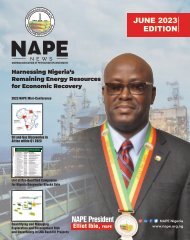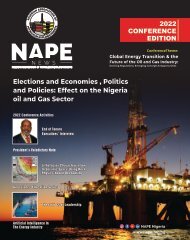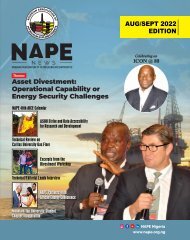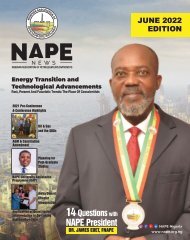NAPENews Magazine August 2021 Edition
NAPE News Magazine August 2021 Edition of the NAPE News is here for your reading pleasure. Happy reading.
NAPE News Magazine August 2021 Edition of the NAPE News is here for your reading pleasure. Happy reading.
Create successful ePaper yourself
Turn your PDF publications into a flip-book with our unique Google optimized e-Paper software.
EMBRACING ENERGY TRANSITION
Energy Industry, university and
Government should be linked.
• G e o s c i e n t i s t s a n d
energy explorers are charged to
engage and adapt to the
changing policy and investment
landscape, contribute and lead
efforts to decarbonise the
current available energy system
and be nation “Nigeria”
focussed.
Mrs. Patience Maseli, FNAPE
Should today's oil and gas
companies be viewed only as
part of the problem, or will we be
crucial in solving it? Considering
the degree of carbon emission,
we contribute to the atmosphere
and stratosphere. The following
f o c u s p r o v i d e s s o m e
perspectives on how we should
respond to the energy transition
curve:
• Rising demand for the
services provided by the energy
sector due to an increasing
global population.
Should today's oil
and gas companies
be viewed only as
part of the problem,
or will we be crucial
in solving it?
• Recognition of the critical role
oil and natural gas play in today's
energy and economic systems.
• The imperative to reduce
energy related emissions in line
with international climate targets
amidst Political urgency at the
international level.
• Our industry entry points in
the transition should include the
following:
• Cost vs Reward potential:
consider the value of developing
low carbon technologies with
current industry operators.
• Collaboration Advocacy and
global industry engagement.
• Experience and Expertise
Knowledge sharing to support
climate solutions and achieve
net zero goals.
Prof K. Mosto Onuoha FAS,
FNAPE, FNMGS contributed on
the aspect of curriculum review &
Jobs creation as below:
The oil and gas industry is
currently facing opposition from a
public greatly concerned with the
environmental impact of fossil
fuels, ever more sceptical
shareholders and challenges
from policy makers seeking to
simultaneously meet energy
transition or decarbonisation
goals vis a vis expected oil and
gas demand.
The increasingly negative image
of the oil and gas industry
worldwide is a source of concern
for university educators. This is
also affecting the attraction of
potential students, with students
currently facing perceived or real
diminishing career prospects.
Despite these, the oil and gas
energy sources remain an
important part of the global
energy mix especially in
developing countries. Natural
gas has the potential to remain
an integral component of the low
carbon energy transition for
decades to come, however this is
dependent on the policy
mechanisms and technologies in
place.
In the years ahead, our
geoscience programmes will
continue to thrive only if
Some future graduates
may find themselves
in occupations that
did not exist a decade
ago, while others will
find themselves in
occupations that are
yet to be invented.
graduates can demonstrate
well-grounded knowledge and
skill sets in innovative thinking.
In the light of the energy
transitions, the following
questions are important:
• What concepts, skills and
c o m p e t e n c i e s d o
u n d e r g r a d u a t e s n e e d t o
s u c c e e d i n t h e i r f u t u r e
workplaces?
• What are the best teaching
practices and most effective use
of technology available to
enhance student learning?
Courses and activities to be
adapted include Quantitative
reasoning and computational
skills. They need to be
incorporated into the existing
c u r r i c u l u m , a l o n g s i d e
p r o f e s s i o n a l s k i l l s
(communication, teamwork,
project management and
employability skills).
Authentic field experiences
gathered through physical or
virtual field trips, research
projects, exercises with real data
acquisition and analysis, system
thinking, and problem-solving
skills will also need to be more
strategically and well designed
as part of the learning scheme.
Furthermore, geoscientists
need to combine critical thinking
skills. Lecturers need to become
adept at active teaching
strategies that pedagogical
research has shown to motivate
students and improve learning.
There is a need to introduce
experiential learning courses
and inquiry-based activities
a m o n g t h e a c a d e m i c
community.
Learning should adopt current
and emerging technology and
computational models and
simulations with large data sets
in overall teaching.
Student needs to be helped to
b u i l d a m o r e d e t a i l e d
foundational understanding of
how the Earth system works, so
they can apply this knowledge to
c o m p l e x a n d p r e v a i l i n g
geoscience and industry issues.
In view of the emerging
transition, employers are already
responding to this new reality
that includes the use of
multidisciplinary teams drawn
f r o m a b r o a d r a n g e o f
background, experiences, and
capabilities to form integrated
teams. Opportunities for job
prospects keeps growing and
may include:
• A w i d e n i n g r a n g e o f
employment opportunities for
geoscientists.
• Broader array of career
advancement opportunities for
staff with training in economics,
risk management, ethics & policy
and accompanied with soft
employability skills.
• Some future graduates may
find themselves in occupations
that did not exist a decade ago,
while others will find themselves
in occupations that are yet to be
invented.
As you prepare yourselves and
industry for the emerging
transition, I leave you to ponder
on these questions, as we
implore you to embrace and
prepare ahead for the emerging
scopes of the Energy Transition.
• Do you think Nigeria as a
country is ready for the Energy
transition?
• Do you think it is time for
NAPE to consider a name
change to reflect this current
propagation towards renewable
energies, as we look forward to
the emerging scopes of the
Energy Transition?
Compiled by - Tunbosun Afolayan
NAPENEWS AUGUST 2021 12










